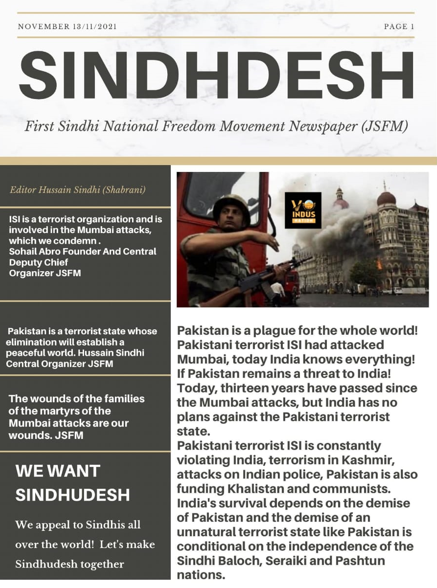If the title of this article had said just ‘4G Debate’, readers may be excused if they ignored it thinking it about spectrum auction scams related to underhand dealing no matter which government is in power.
But it is about two issues that involve Fourth Generation Warfare (4GW) that are currently under discussion in the media. One, talk by the NSA on what modern war (4GW) is all about, and, two, MP Manish Tewari’s book ‘10 Flash Points; 20 Years: National Security Situations Affecting India’, released concurrent to the 13th anniversary of the 26/11 Mumbai terrorist attacks.
The anniversary celebration of the security forces’ actions at the national level like everything else are linked to elections; be it the 26/11 terror attacks, the 1971 victory over East Pakistan, surgical strikes, Balakot strike or whatever.
The Congress is planning big celebrations for the 1971 victory in December. So Defence Minister Rajnath Singh was seen rushing off to Rezang La, even pushing a battle veteran’s wheelchair. Otherwise he has done little for the rank and file of the Armed Forces compared to going all out for police forces when he was the Home Minister.
Pakistan’s High Commissioner was summoned this time for expediting trial in the 26/11 terror attacks—should this not be on every anniversary? Nothing happened on the first anniversary of surgical strikes but the second anniversary celebrations witnessed elaborate national level events—we all know why.
An erudite veteran posted on social media recently: “Sab bhool gaye bhool jane do, sab yaad karenge matlab ke din aane do.” But the humorous part is the belief that this charade will not be observed.
How the NSA while addressing the passing out parade of IPS probationers at the National Police Academy on November 12 downplayed the external threat was described in these columns earlier.
His emphasis was that the new frontiers of war is the civil society since wars have become ineffective, too expensive, and with uncertain outcomes. It appears he believes war means only ‘conventional’ war, as also is interpreted by politicians and bureaucrats. Having defined the “new frontiers of war”, the NSA proposed police as the panacea to defend the nation.
There were interesting reactions to the NSA’s newfound theory of war and how to counter it. One opines: “I agree with the NSA whose views match those of our first Prime Minister. Since India is a peace loving country with no enmity towards anyone, it doesn’t require defence forces. A portion of police armed with light weapons are adequate to maintain law and order.”
Another view is: “By maneuvering, cajoling and bullying the civil society using police, he can better serve his masters by ensuring poll victories. Nation is secondary.” An eminent scholar points out that the result of placing police forces at the borders in Ladakh and in sectors elsewhere is visible to the world no matter how much the government tries to hide the territorial losses.
But just like politicians and bureaucrats perceive that war means only conventional war, most think national security is limited to ‘military security’. So if the new frontier of war is civil society, an internal security strategy should suffice. Where is the need for a national security strategy? Is that why the NSA has not defined the National Security Strategy for which he was tasked in 2019?
An important element of 4GW is terrorism operating in low intensity conflict. It recognizes no borders, rules and regulations and is opaque. Such wars, militaries have been, are, and will continue to fight around the world. But despite India being subjected to proxy wars by China and Pakistan in the past decades, we have done nothing to fight this 4GW bleeding us. We continue to live in adverse strategic asymmetry vis-à-vis China and Pakistan at the sub-conventional level.
If we think that the answer to 4GW is a posse of policemen then we are like frogs in the well desperately trying to ward off the torrential rain by wrapping ourselves in raincoats.
Deterrence against proxy wars involves capacity building, ‘selectively’ demonstrating it and taking the war into enemy territory. We have failed to do so. There was ‘nothing’ pro-active in the surgical strikes, Balakot, and the raid inside Myanmar because these were ‘reactions’ to casualties inflicted on us. The government had no option but ‘react’ for fear of losing public support at home.
Politicians bragging about these actions periodically only amuses our adversaries and terrorists, as does watching our policy makers strut around like Rommel wearing all types of hats—caps with military insignia but without the guts to ‘wage’ 4GW.
An operation like ‘surgical strikes’ can well be executed at the level of Army or Corps Commander level and did not require copycatting Obama and Co monitoring the killing of Osama bin-Laden which was a far more complex operation.
The Army needs to be ‘actually’ given a free hand, not mere media insertions. Our battalion commanders have enough fire in them to make life miserable for the terrorist on both sides of the border. The NSA needs to look deeper and for starters ask himself why not a single terrorist leader holding open anti-India rallies in Pakistan has been targeted.
Manish Tewari’s book saying India should have acted against Pakistan after 26/11 is bonanza for the BJP to slam the Congress. The BJP spokesperson calls it “confession of the failure of the Congress.” Did Tewari, who also served as Union Minister in the UPA government, ever take this up with his Prime Minister? He did actively canvass to bring all intelligence agencies under parliamentary oversight but no Indian government will allow that.
The reality of India in terms of building deterrence against proxy wars is utterly dismal. India had all the chance to fan dissent in Pakistan-occupied-Kashmir (POK) while Pakistan was busy changing its demography, targeting the Shia community and reducing the Shia population from 70 percent to 50 percent. Unrest in Gilgit-Baltistan would have cautioned China against venturing into the region. But India did nothing.
For the past several years, Afghan scholars and delegations visiting India (both during Congress and BJP rule) were advocating that Pakistan despite being sandwiched between India and Afghanistan is terrorizing both nations, which must be answered in the same language—dual India-Afghanistan 4GW response. But India lacked the will.
The Balochis subjected to China-supported Pakistani genocide have been fighting for independence for the past 70 years. Why has India not helped them? We claim affinity with the Sindhis in Pakistan but have we assisted their independence struggle?
The first national freedom movement newspaper of Sindh laments that India knows Pakistan is behind the 26/11 terrorists attacks, is constantly violating India, behind terrorism in Kashmir, attacking Indian police, funding Khalistan and the communists, but India has no plans against the Pakistani terrorist state, even as independence of the Sindhi, Baloch, Seraiki and Pashtun nations depends on the demise of the terrorist state of Pakistan.

The Indian Army has very good relations with the Tatmadaw (Myanmar Army) but India is forfeiting the chances of joint operations of the two armies against insurgent camps by cold-shouldering the caretaker government of Myanmar even though terrorists after the ambush on the Assam Rifles convoy on November 13 in Manipur retreated into Myanmar. No wards of politicians and bureaucrats join security forces so why bother who gets killed!
Witness the present state of Pakistan. Its external debt is at an all-time high breaking all records. The IMF has refused it permission for loans from international banks, forcing Pakistan to seek loans-investments from private banks and Gulf nations. Pakistan has surrendered to extremists of Tehreek-e-Labbaik Pakistan (TLP), released all TLP cadres from prison and removed the ban on them.
The current one-month truce between Pakistan and the Tehrik-i-Taliban Pakistan (TTP) is fragile. TTP wants its cadres and leaders in prison to be released and wants Sharia rule in Pakistan, which Pakistan terms “ridiculous”. Pakistan wants the TTP to accept the Pakistani Constitution. So there is no meeting ground.
Pakistani air raids have been targeting mosques, buildings and killing civilians in parts of Khyber Pakhtunkhwa (KPK) while large parts of Waziristan are already under TTP control and influence of the group is expanding in KPK. Bombing of Mosques in particular, which may be inadvertent, has roused the anger in the TTP and the Pashtuns.
The Baloch Liberation Army (BLA) has intensified operations and there are mass anti-Pakistan protests in Gwadar against excessive checking, shortage of food, water, electricity and Chinese trawlers allowed fishing which is denting the livelihood of locals.
A recent development is the split in Taliban because of Chinese genocide against Muslims in Xinjiang. There are reports of Taliban cadres joining the ISIS-K for taking revenge against China.
Hoping for the political hierarchy and the NSA to respond to China’s 4GW is futile but can there be better opportunity for India than the current one to exploit the fault-lines of Pakistan.
As a nation, can we act rather than sit on the fence and hope for Lady fortune to smile? Many external actors and outfits are ready to help but can we muster the national will?
(The author is a veteran of Indian Army. Views expressed are personal)
The author is an Indian Army veteran. The views expressed are of the author and do not necessarily reflect the views of Raksha Anirveda






